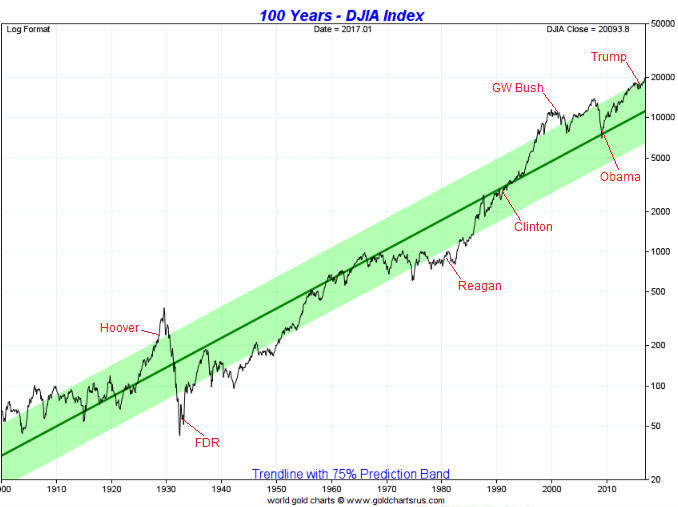Putting aside the fact that prior to the US Presidential election last November almost everyone believed that a Trump victory would result in a weak stock market, the popular view now is that the stock market has strengthened since the election due to the incoming Trump Administration being more pro-business. It is arguable whether the Trump Administration really will be “pro-business” (early signs are that it won’t be), but in any case the historical record indicates that the currently-popular view is total nonsense.
According to the historical record, the stock market’s performance during a Presidential term has nothing to do with the extent to which the Administration is pro-business. Let’s consider some examples to help make this point, using the Dow Industrials Index as our stock-market proxy and the November election dates as the starting and ending points of a presidential term. It makes sense to use the election dates rather than the inauguration dates given that the financial markets will begin to discount the economic effects of a new president immediately after the election result is known.
First, F. D. Roosevelt probably led the most anti-business administration in US history, but during FDR’s first 4-year term the stock market had a phenomenal gain of about 160%.
Second, Ronald Reagan was supposedly a very pro-business president, but during his first 4-year term the stock market gained only 26%. The stock market’s gain during Reagan’s first term was not only a tiny fraction of the gain achieved during FDR’s first term, it was also less than the roughly 40% gain achieved during the first term of the supposedly anti-business Obama Administration.
Third, the stock market did much better during Reagan’s second term, enabling Reagan to chalk up an 8-year stock-market return of about 120%. This, however, wasn’t substantially better than the 90% gain chalked up by the anti-business Obama and pales in comparison to the 240% gain achieved by the Dow over the course of Bill Clinton’s two terms.
Fourth, two of the worst stock-market performances occurred during the supposedly pro-business administrations of Herbert Hoover and G. W. Bush. The Dow was down by a little more than 10% over the course of G. W. Bush’s two terms and by an incredible 70+% during Hoover’s single term in office.
To summarise the above, the historical record isn’t consistent with the view that a more pro-business President results in a stronger stock market.
There are, of course, a number of influences on how the stock market performs during any presidential term, including the amount of domestic monetary inflation and what’s happening throughout the world. One influence, however, dominates all others. That influence is the point in the valuation cycle at which a presidential term starts and ends. The reality is that some presidents get lucky with timing, others don’t.
I’ll explain what I mean with the help of the following long-term Dow chart. The chart was created by Nick Laird at goldchartsrus.com, but I added the red notes to indicate the first election victories of various presidents.

The above chart shows that when it comes to the gains achieved by the stock market during a presidency, timing is critical. For example, despite FDR implementing a set of policies that were economically disastrous, the stock market rocketed upward during his first term because at the start of the term the Dow was well below the bottom of its long-term channel.
However, by the start of FDR’s second term the Dow had recovered to near the middle of its long-term channel, resulting in much weaker subsequent performance. For another example, there is no doubt that Hoover and G. W. Bush were terrible presidents, but they were certainly no worse than their successors and yet the stock market’s performance was relatively dismal during their presidencies. This is mainly because their presidencies began with the Dow above the top of its long-term channel.
Trump’s presidency is beginning with the Dow at the top of its long-term channel. This pretty much guarantees that the US stock market’s performance over the course of the next 4 years will be dismal, regardless of whether or not Trump’s policies are “pro-business”.
